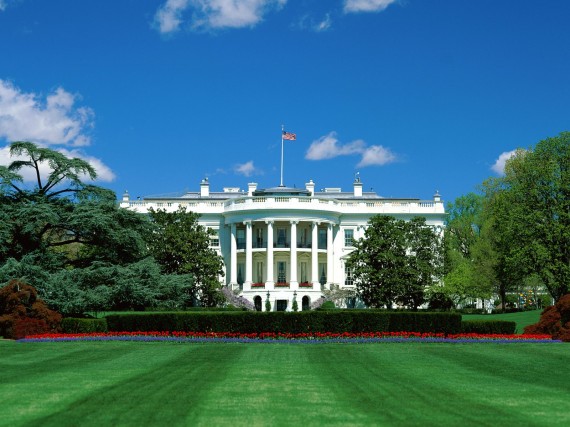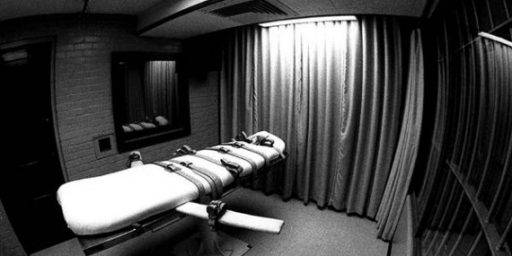Can A President Become Irrelevant?
No matter how weak he becomes, no President will ever be completely irrelevant to the political process.
Commenting on a Michael Tomasky piece that repeats many of the same complaints that Frank Rich and Maureen Dowd have made of late about the Obama Presidency, Jazz Shaw asks a question:
All of this brings us back our joint entry and exit question: can a sitting president ever become completely irrelevant in American politics? And has Barack Obama already achieved that dubious distinction?
Notwithstanding the bungling of the Obama Administration, and the fact the President has either ceded control of domestic legislation to Congress (i.e, the 2009 stimulus and health care form) or surrendered to the Republicans with barely a fight (i.e., extension of the Bush tax cuts, resolution of the FY2011 budget, and the debt ceiling extension), I think the answer has to be a fairly emphatic no. Even a politically weak President with a low job approval rating in a time of economic uncertainty retains a certain level power, both that granted by the Constitution and that assumed by Presidents over the past 221 years, still retains a significant amount of power in both the foreign and economic policy arenas. Calling him (or, one day, her) irrelevant is a nice turn of phrase, but it isn’t at all accurate.
The easiest argument against the “irrelevant Presidency” argument, of course, comes in the foreign policy arena. The President’s powers as Commander-in-Chief, combined with the fact that Congress has largely ceded any role in this particular arena since the end of World War II to the Executive, means that any President has significant authority to both commit American forces around the world, and alter the direction of American foreign policy in ways that can change the world. Theoretically, Congress could take action to restrain the President in this arena. Historically, they have proven exceedingly reluctant to do so. By default, then, the Presidency’s vast discretion over the way American interacts with the rest of the world means that he’ll never be entirely irrelevant.
Domestically, the President is more constrained because nothing can become law without Congressional acquiescence. At the same time, though, Congress has been very helpful to the Executive Branch by granting significant discretion to a myriad of regulatory agencies and cabinet departments charged with implementing the laws that it has passed. Congressional oversight of these agencies exists, but it’s typically lax, and a President who really wants to effect public policy with minimal effort can do so through the rule-making process. On top of that, you’ve got the Presidential veto, which virtually ensures that nothing can become law unless the President agrees to it. Given that Congress has successfully overridden a Presidential veto only 109 times in the history of the Republic (with 2,560 vetoes through 2010, that’s an override rate of 4.28%), the odds suggest that a veto would be successful. That alone makes a President vitally relevant to the legislative process, as long as Congress believes they’d follow through on a veto threat.
So, no, a President can never really be entirely irrelevant.
However,a President can make themselves seem irrelevant by failing to exercise the powers granted to them, of course, or by failing to stand up to an assertive Congress. Is this Obama’s problem? To some degree it is, but it’s not something that he’s going to be able to fix very easily. From the time he came into the White House, President Obama has chosen to “lead from behind,” or perhaps not lead at all, when it comes to his domestic policy agenda. The 2009 stimulus was put in the hands of the newly emboldened Democratic Congress, which is why it ended up looking more like a payoff to long time party friends than a package that had any hope of stimulating the economy. While the White House was involved behind the scenes during the health care debate, the President largely let Congress lead the public debate. Perhaps the White House thought that such a strategy would deflect the public criticism over the plan toward Congress rather than the White House,but if that was the strategy it has failed miserably. Now, faced with an assertive Republican majority in the House and an active Republican minority in the Senate, the President finds himself largely unable to do much else other than make speeches about plans that will never be implemented.
Irrelevant? Perhaps not. Weak, indecisive, and floundering? Absolutely. And that’s the recipe for a pretty bad re-election year.






I don’t know why you act as if the question is a serious one. You go to HotAir and you find hacks who see their mission in life to find new and exciting ways to insult Obama, on a daily basis. I don’t imagine too many people take them seriously – I wonder why you do.
I refuse to acknowledge that the President who took out Bin Laden and Ghaddafi* could possibly be “irrelevant”. In fact, I think the whole question about it is absurd, just another overreaction over the policies of someone who, frankly, prefers to work behind the scenes anyway. Everyone’s killing Obama for capitulating – and I have as well, especially on the EPA rules – but he’s not the kind of guy who twists arms in the first place. He’s too subtle for that.
* I state this agreeing that we should never have been in Libya. Still, it should be noted.
@Tano:
It’s a question that gets asked many times, with many different Presidents.
Also, at least I’m not reading Daily Kos.
@Doug Mataconis:
If you are going to read HotAir, then you probably should read Kos. Granted, the latter is quite a bit more amateurish, but that might actually be an advantage. HotAir are professional hacks, and I always found them the least interesting of all. Personally, I cant stand more than five minutes a year of either.
@Tano: So Tano, where do you get your political coverage? I’d like to spend some time there, really, so I can learn why I am so misguided.
As if that is a legitimate defense for sharing obviously biased talking points from HotAir, or as if Daily Kos is somehow worse than HotAir…please…
Obama will never achieve irrelevance. The simple reason for that is that disasters are seldom irrelevant
A position of power may always have ability to be relevant. However if the person in that position is very weak, let others subvert that power, or simply does what others tell him then yes that person can become irrelevant.
IMO Obama has been irrelevant or mostly so in many areas that most President haven’t been. However his administration has used backdoor tactics and abused executive powers in some very relevant ways. His use of regulatory agency to attack and threaten businesses has hurt this economy. So yes in some areas he has been relevant.
Using the term “completely irrelevant”, may allow you technical points on being factual. However the truth is that a President can be for practical purposes irrelevant. To restate my position, I think Obama is there in some areas and not others.
I guess the “disasters” bit is referring to are the death of bin laden and gaddafi’s fall from power. Dark times indeed for conservatives…
@anjin-san: Indeed, huge accomplishments with world shaking consequences. This will be the foundation of the President’s legacy; nevermind the disintegration of the world’s economy, catalyzed by the ignorance of this pampered, ill-prepared, inexperienced, shallow political puppet.
Pete, how true. The economy was in splendid shape when Obama took office. It’s all his doing. Quite so.
OK, Anjin, you’ve re-established yourself as the leftist true believer.
But let’s not forget that the reason Obama is able to take credit for any of that is that he continued Bush policy in those areas. Indeed, the only area he’s had any success at all is where he’s copied Bush.
@ bithead
If Obama was copying Bush, bin laden would be alive and plotting his next attack. Got anything besides material for comedy tonight?